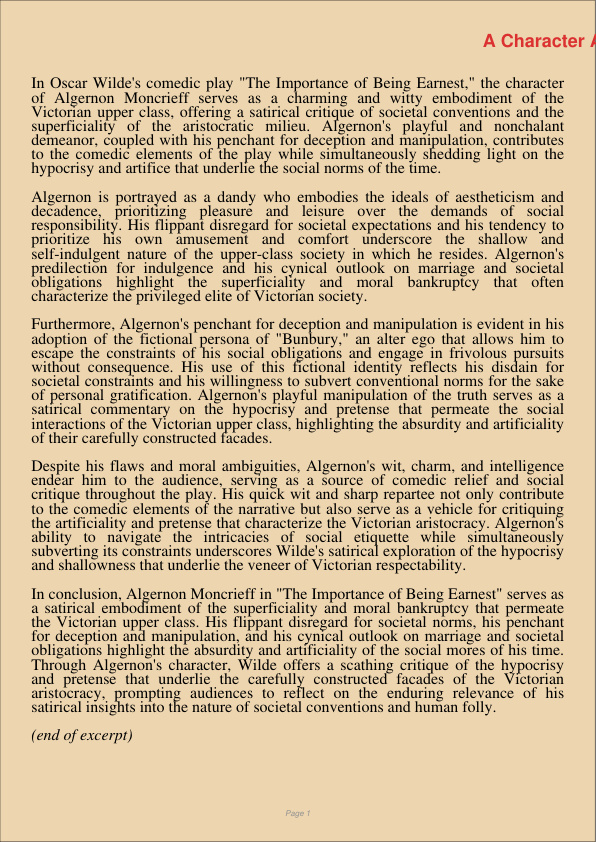In Oscar Wilde’s comedic play “The Importance of Being Earnest,” the character of Algernon Moncrieff serves as a charming and witty embodiment of the Victorian upper class, offering a satirical critique of societal conventions and the superficiality of the aristocratic milieu. Algernon’s playful and nonchalant demeanor, coupled with his penchant for deception and manipulation, contributes to the comedic elements of the play while simultaneously shedding light on the hypocrisy and artifice that underlie the social norms of the time.
Algernon is portrayed as a dandy who embodies the ideals of aestheticism and decadence, prioritizing pleasure and leisure over the demands of social responsibility. His flippant disregard for societal expectations and his tendency to prioritize his own amusement and comfort underscore the shallow and self-indulgent nature of the upper-class society in which he resides. Algernon’s predilection for indulgence and his cynical outlook on marriage and societal obligations highlight the superficiality and moral bankruptcy that often characterize the privileged elite of Victorian society.
Furthermore, Algernon’s penchant for deception and manipulation is evident in his adoption of the fictional persona of “Bunbury,” an alter ego that allows him to escape the constraints of his social obligations and engage in frivolous pursuits without consequence. His use of this fictional identity reflects his disdain for societal constraints and his willingness to subvert conventional norms for the sake of personal gratification. Algernon’s playful manipulation of the truth serves as a satirical commentary on the hypocrisy and pretense that permeate the social interactions of the Victorian upper class, highlighting the absurdity and artificiality of their carefully constructed facades.
Despite his flaws and moral ambiguities, Algernon’s wit, charm, and intelligence endear him to the audience, serving as a source of comedic relief and social critique throughout the play. His quick wit and sharp repartee not only contribute to the comedic elements of the narrative but also serve as a vehicle for critiquing the artificiality and pretense that characterize the Victorian aristocracy. Algernon’s ability to navigate the intricacies of social etiquette while simultaneously subverting its constraints underscores Wilde’s satirical exploration of the hypocrisy and shallowness that underlie the veneer of Victorian respectability.
In conclusion, Algernon Moncrieff in “The Importance of Being Earnest” serves as a satirical embodiment of the superficiality and moral bankruptcy that permeate the Victorian upper class. His flippant disregard for societal norms, his penchant for deception and manipulation, and his cynical outlook on marriage and societal obligations highlight the absurdity and artificiality of the social mores of his time. Through Algernon’s character, Wilde offers a scathing critique of the hypocrisy and pretense that underlie the carefully constructed facades of the Victorian aristocracy, prompting audiences to reflect on the enduring relevance of his satirical insights into the nature of societal conventions and human folly.

「真诚赞赏,手留余香」
真诚赞赏,手留余香
使用微信扫描二维码完成支付
